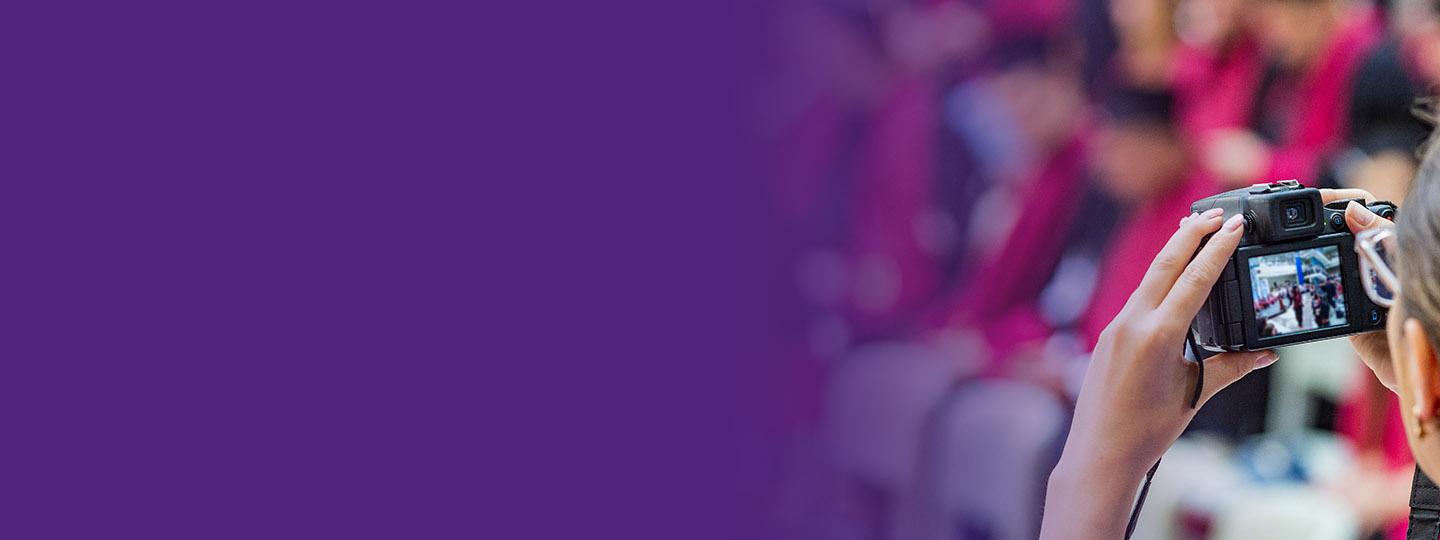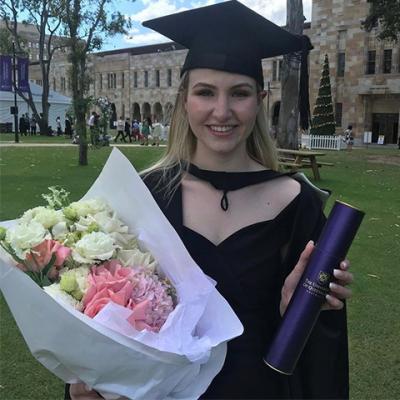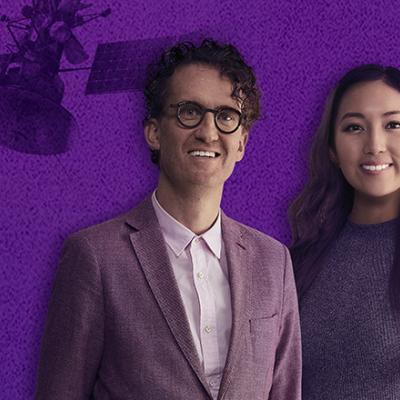Thinking of studying communication at university but not sure what kind of jobs you can land with a qualification in this field? We explore some of the exciting careers in communications available to graduates.
Communication degree jobs are varied. They can be public-facing or behind the scenes, fast-paced or detailed and slower in nature. One thing is for sure though – there are plenty of careers for good communicators out there, especially with the digitisation of the industry constantly evolving.
One of the best things about choosing a communications career path is that you have plenty of scope for movement. Jobs in communications can be quite fluid, with a wealth of opportunities available to those who want to broaden their skillset and try new things.
Whether you want to specialise in one area or become a bit of a jack of all trades, here are a few of the communications graduate jobs you could find yourself excelling in.
Public relations specialist
The public relations team is an integral part of any organisation. They’re quick-thinking problem solvers who thrive in a fast-paced media environment.
A public relations specialist can find work in government, corporate, media and NGO sectors. Many communications graduates start out as public relations officers, gaining valuable experience in busy marketing and communications agencies. Graduates can work their way up into coordinator, specialist, consultant and management positions within PR, exploring opportunities in different sectors and organisations.
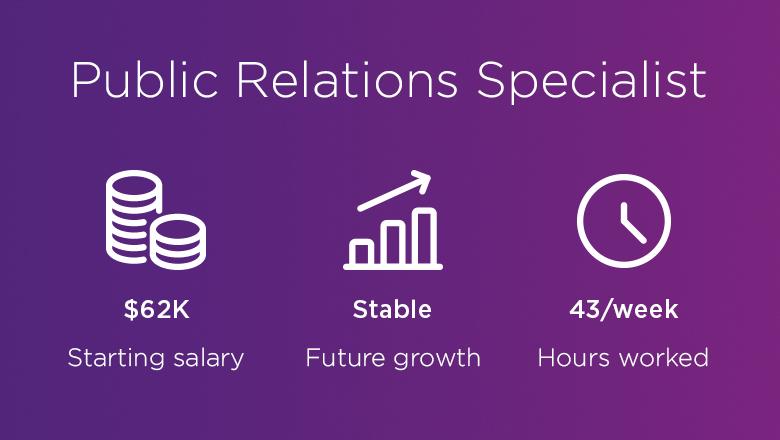
Information sourced from Pay Scale, Your Career and Labour Market Insights.
What does a public relations specialist do?
Public relations specialists promote or create a strategic public image for their clients. They achieve this through:
- cultivating and maintaining relationships with stakeholders
- developing media kit materials
- orchestrating event appearances
- evaluating public opinion
- managing organisational issues and crises.
Public relations specialist skills
To succeed in this career, you need strong interpersonal and communication skills. You'll also need to be able to:
- write and speak confidently and competently
- solve problems
- think on your feet
- work under pressure
- multi-task
- stay on top of media trends
- build and maintain stakeholder relationships.
Public relations offers some of the most reactionary jobs in communications. Discover how you can build your skillset in this area through UQ’s Bachelor of Communication – Public Relations major.
Meet Naomi
Naomi graduated from UQ’s Bachelor of Communication in 2021 and is now working as a senior account executive with BCW Global, a multinational public relations and communications firm.
Naomi’s role includes working with colleagues across Australia and the APAC region to devise strategies, produce media materials and support clients facing complex communication challenges.
“Day-to-day, I produce a lot of internal and external communication materials such as press releases, communication strategies, social media content and speeches,” Naomi says.
It was her studies, based on real-life projects, that gave Naomi the edge she needed to make it in the competitive communication industry.
“By working on real client projects for assessments and participating in hands-on workshops, I had the opportunity to expand my professional network and develop my skills in a practical manner that was immediately applicable to the role I secured when I graduated," she says.
The networks she developed throughout her degree also spurred on her enthusiasm and helped her to achieve her goals.
“Studying the Bachelor of Communication at UQ prepared me to transition from the classroom to real client work by introducing me to industry experts who were passionate about helping me achieve my career goals.”
Social media manager
Social media is an incredibly exciting field to specialise in right now. As one of the newer jobs in communications teams, it’s constantly evolving, offering new opportunities for brands to engage and interact with their audiences.
Recent communication graduates don't often start out in social media manager positions, however. Instead, they usually begin in social media officer or content creation roles and progress to coordinator and management positions over the course of their career. They may even choose to specialise in social media analyst or community management positions.
What does a social media manager do?
Social media managers are responsible for curating a brand or organisation’s social channels. This includes performing tasks such as:
- monitoring, moderating and responding to audience comments
- managing social media partnerships
- executing multi-platform digital marketing campaigns
- analysing social metrics to inform strategies.
Social media manager skills
Social media management jobs require a unique set of skills, including the ability to:
- think outside of the box
- stay ahead of social media trends
- conduct audience research
- work collaboratively (with influencers, graphic designers, copywriters etc.)
- strategise and adapt their strategies as needed.
Social media courses in UQ’s Bachelor of Communication will provide students with cutting-edge insights into social trends and access to industry experts to explore new and innovative ideas with.
Copywriter
Copywriters are the detail-orientated whizz kids of the marketing and communication world. They work in marketing agencies, in-house for a huge range of organisations and corporations, and they can carve out a fruitful career freelancing as well.
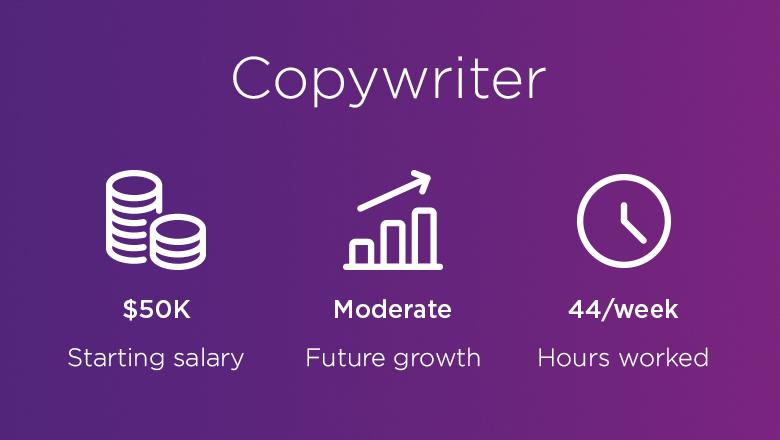
Information sourced from Pay Scale, Your Career and Labour Market Insights.
What does a copywriter do in marketing?
Copywriter duties revolve around writing clear and concise content for print and digital marketing materials. The day-to-day responsibilities of a copywriter include:
- writing captivating copy
- editing and proofreading
- maintaining brand voice
- researching audiences and topics
- conducting search engine optimisation (SEO) research
- collaborating with graphic designers and other digital marketers.
Skills required for copywriting
Copywriter jobs always list strong written communication skills as the most desirable skill for this role. To be a proficient copywriter, you’ll also need:
- attention to detail
- adaptability
- confident research skills
- creativity
- teamwork skills.
The career flexibility provided to copywriters makes this an ideal path for graduates who want to work and travel.
Meet Rosy
Rosy graduated from UQ’s Bachelor of Communication in 2017 and is now working as manager of communications strategy for the NSW Department of Industries – Fisheries. Rosy’s role is to communicate to the public the important work her branch undertakes to support native fish recovery in inland NSW. She explains that her days involve a large variety of tasks, encompassing several different media and marketing skills.
“In a day, I could write a media release, create a video, draft a briefing note, a fact sheet or organise a stakeholder engagement event,” she says.
“I also regularly organise content for the NSW DPI Fisheries Facebook page and organise media events with our media team and our Minister’s Office.”
Rosy describes herself as a ‘jack of all trades’ in her role, and we can see why!
For Rosy, the best piece of advice she received during her studies was not to be lazy with her writing. As a communications manager, it’s essential to have an eye for detail while editing, proofreading and composing stories.
“We’re working to engage journalists, viewers, readers and social media users with competing stories – and their attention span is already clogged!” says Rosy.
“In comms, our writing (and by extension, our stories) – be it a media release, social post or a fact sheet – have to be concise, have to grab readers and must be impactful. Otherwise what’s the point, right?”
Six years on from graduation, Rosy explains that she still uses the skills she learned during her Bachelor of Communication every day. From writing media releases to filming and editing short videos, she continues to draw on this knowledge as her career progresses.
Digital content producer
With the rise of digital platforms, it has never been more important for organisations to have digital content producers. They work in a variety of sectors and use their skills in several areas of media production to enhance a brand’s online presence.
What does a digital content producer do?
A digital content producer is responsible for writing, editing and publishing content for a variety of platforms, including websites, videos, marketing campaigns, social media and more. Their day-to-day duties include:
- audience research
- collaborative brainstorming
- creating digital content
- editing and proofreading
- maintaining and updating content management systems
- briefing graphic designers, videographers and social media marketers.
Skills of a digital content producer
Digital content producer jobs often require a wide skillset and experience with a range of digital media. To excel in this role, you’ll need:
- strong knowledge of how to engage audiences
- aptitude for creative storytelling
- experience with content management systems
- sound proficiency in content production software (e.g. Adobe Creative Suite)
- understanding of social media marketing and SEO best practices
- clear communication.
Want to know more about the types of careers you can pursue with a university degree in humanities and social sciences?

